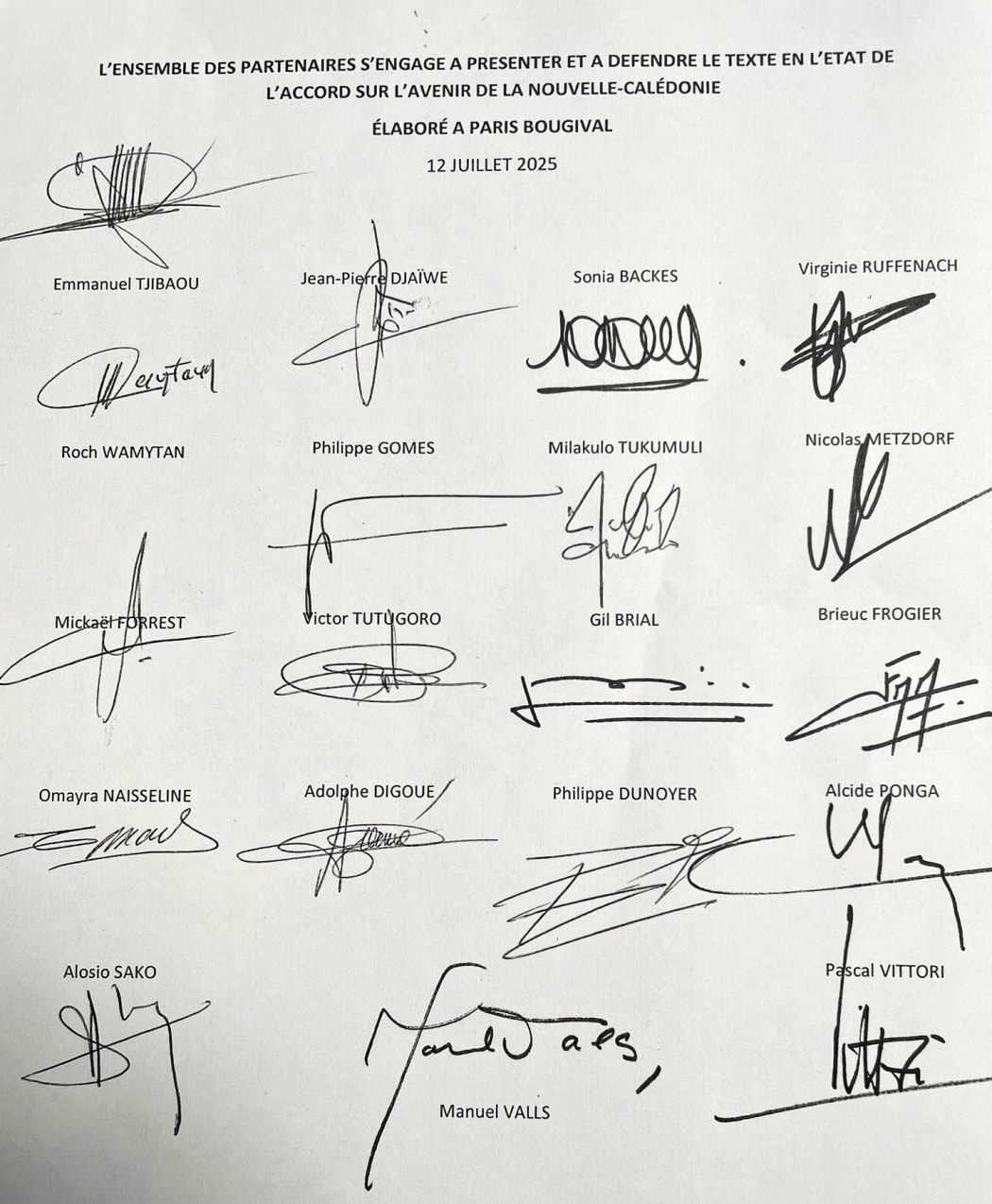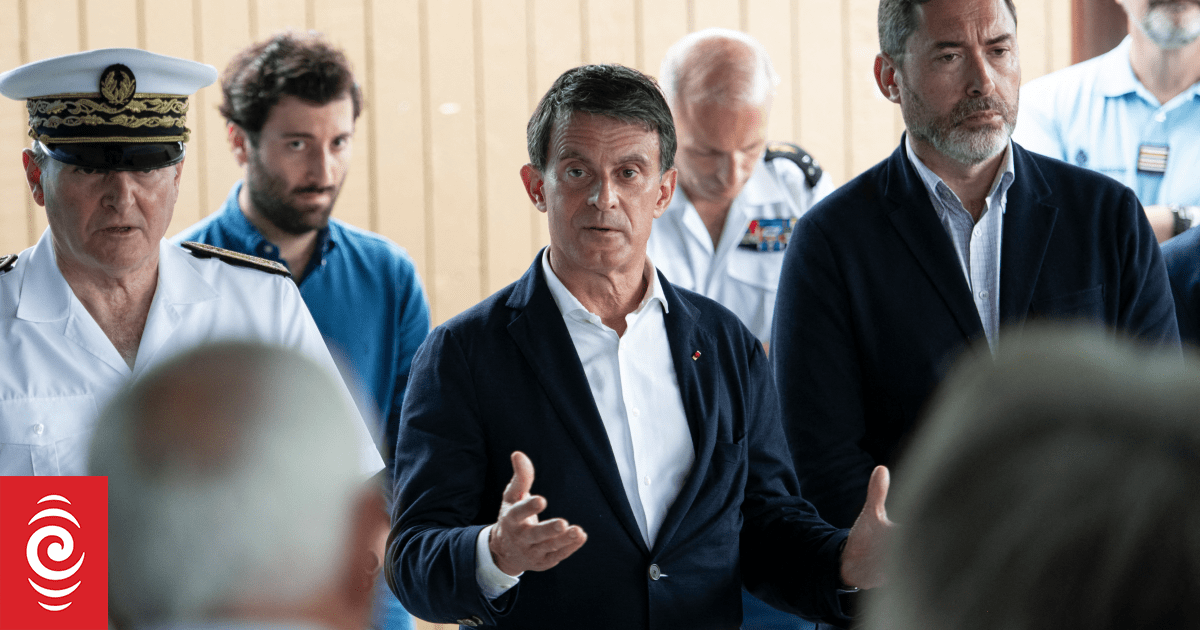Manuel Valls takes part in the welcoming ceremony.
Photo: Delphine Mayeur / Hans Lucas / AFP
French Minister for Overseas Manuel Valls is once again in New Caledonia for a four-day visit aimed at maintaining dialogue, despite strong rejection from a significant part of the pro-independence camp.
He touched down at the Nouméa-La Tontouta Airport on Tuesday evening (local time), his fourth trip to New Caledonia since he took office late 2024.
For the past eight months, he has made significant headways by managing to get all political parties to sit together again around the same table and discuss an inclusive, consensual way forward for the French Pacific territory, where deadly riots have erupted in May 2024, causing 14 deaths and over €2 billion in material damage.
On 12 July, during a meeting in Bougival (West of Paris), some 19 delegates from parties across the political spectrum signed a 13-page document, the Bougival Accord, sketching what is supposed to pave the way for New Caledonia’s political future.
The document, labelled a “project” and described as “historic”, envisages the creation of a “State” of New Caledonia, a dual New Caledonia-French citizenship and the transfer of key powers such as foreign affairs from France to New Caledonia.
The document also envisions a wide range of political reforms, more powers for each of the three provinces and enlarging the controversial list of eligible citizens allowed to vote at the crucial local provincial elections.
When they signed the text mid-July, all parties (represented by 18 politicians) at the time pledged to go along the new lines and defend the contents, based on the notion of a “bet on trust”.
But since the deal was signed at the eleventh hour in Bougival, after a solid ten days of tense negotiations, one of the main components of the pro-independence camp, the FLNKS, has pronounced a “block rejection” of the deal.
FLNKS said their delegates and negotiators (five politicians), even though they had signed the document, had no mandate to do so because it was incompatible with the pro-independence movement’s aims and struggle.

Signatures on the last page of New Caledonia’s new agreement
Photo: Philippe Dunoyer
FLNKS rejection of Bougival
The FLNKS and its majority component, Union Calédonienne, said from now on, while maintaining dialogue with France, they would refuse to talk further about the Bougival text or any related subject.
They also claim they are the only pro-independence legitimate representative of the indigenous Kanak people.
They maintain they will only accept their own timetable of negotiation, with France only (no longer including the pro-France parties) in “bilateral” mode to conclude before 24 September 2025.
Later on, the negotiations for a final independence should conclude before the next French Presidential elections (April-May 2027) with the transfer of all remaining powers back to New Caledonia.
The FLNKS also demands that any further talks with France should take place in New Caledonia and under the supervision of its President.
It warns against any move to try and force the implementation of the Bougival text, including planned reforms of the conditions of voter eligibility for local elections (since 2007, the local “special” electoral roll has been restricted to people living in New Caledonia before 1998).
During his four-day visit this week (20-24 August), Valls said he would focus on pursuing talks, sometimes in bilateral mode with FLNKS.
The Minister, reacting to FLNKS’s move to reject the Accord, said several times since that he did not intend to give up and that his door remained open.
The FLNKS confirmed on Wednesday at a press conference its rejection of the Bougival draft agreement and called for provincial elections to be held next November.
Photo: AFP / Delphine Mayeur
‘Explain and convince’
He would also meet “as many (New) Caledonians as possible” to “explain and convince”.
Apart from party officials, Valls also plans to meet New Caledonia “Customary (chiefly) Senate”, the mayors of New Caledonia, the presidents of New Caledonia’s three provinces and representatives of the economic and civil society.
The May-July 2024 riots have strongly impacted New Caledonia’s standard of living, with thousands of jobless because of the destruction of hundreds of businesses.
Health sector in crisis
Valls also intends to devote a large part of his visit to meetings with public and private health workers, who also remain significantly affected by an acute shortage of staff, both in the capital Nouméa and rural areas.
On Thursday, Valls plans to implement one of the later stages of the Bougival signing: the inaugural session of a “drafting committee”, aimed at agreeing on how necessary documents for the implementation of the Bougival commitments should be formulated.
These include working on writing a “fundamental law” for New Caledonia (a de facto constitution) and constitutional documents to make necessary amendments to the French Constitution.
The independence flag at the FLNKS press conference in Noumea.
Photo: AFP / Delphine Mayeur
Elections again postponed to June 2026
Steps to defer once again the provincial elections from November 2025 to May-June 2026 were also recently taken in Paris, at the Senate, Valls said earlier this week. A Bill is tabled for debates in the Senate on 23 September 2025. In keeping with the Bougival commitments and timeline, it proposes a new deadline for provincial elections: no later than 28 June 2026.
But FLNKS now demands that those elections be maintained for this year.
On a tightrope again
This week’s visit is perceived as particularly sensitive: as Valls’s trip is regarded as focusing on saving his “Bougival” deal, he is also walking on a tightrope.
On one side, he wants to maintain contact and an “open-door” policy with the hard-line group of the FLNKS, even though they have now denounced his Bougival deal.
On the other side, he has to pursue talks with all the other parties who have, since 12 July, kept their word and upheld the document.
If Valls was perceived to concede more ground to the FLNKS, following its recent claims and rejections, parts of the pro-Bougival leaders who have signed and kept their word and commitment could well, in turn, desolidarise and denounce some kind of betrayal, thus jeopardising the whole, precarious equilibrium.
The “pro-Bougival” signatories held numerous public meetings with their respective militant bases to explain the agreement and the “Bougival spirit”, as well as the reasons why they had signed.
This not only includes pro-France parties who oppose independence, but also two moderate pro-independence parties, the PALIKA (Kanak Liberation Party) and the UPM (Union Progressiste en Mélanésie), formed into a “UNI” platform (Union Nationale pour l’Indépendance), who have, since August 2024, distanced themselves from the FLNKS.
At the same time, FLNKS took into its fold a whole new group of smaller parties, unions and pressure groups (including Union Calédonienne-created CCAT (field action coordination group dedicated to organising political campaigns on the ground) and has since taken a more radical turn.
Simultaneously, Christian Téin, head of CCAT, was also elected FLNKS president in absentia, while serving a pre-trial jail term in mainland France.
His pre-trial judicial control conditions were loosened in June 2025 by a panel of three judges; but he is still not allowed to return to New Caledonia.
One of the moderate UNI leaders, Jean-Pierre Djaïwé (PALIKA) told his supporters and local media last week that he believed through the Bougival way, it would remain possible for New Caledonia to eventually achieve full sovereignty, but not immediately.
Ruffenach: No intention to ‘undo’ Bougival
Several pro-France components have also reacted to the FLNKS rejection by saying they did not intend to “undo” the Bougival text, simply because it is the result of months of negotiations and concessions to reach a balance between opposing aspirations from the pro-independence and pro-France camps.
“Let’s be reasonable. Let’s get real. Let’s come back to reality. Has this country ever built itself without compromise?”, pro-France Le Rassemblement-LR party leader Virginie Ruffenach told Radio Rythme Bleu on Tuesday.
“We have made this effort at Bougival, to find a middle way which is installing concord between those two aspirations. We have made steps, the pro-independence have made steps. And this is what allowed this agreement to be struck with its signatures”.
She said the FLNKS, in its “new” version, is “held hostage by (…) radicalism”.
“Violence will not take the future of New Caledonia and we will not give into this violence”.
She said all parties should now take their responsibilities and live up to their commitment, instead of applying an “empty chair” policy.
No credible alternative: Valls
Earlier this week, Valls repeated that he did not wish to “force” the agreement but that, in his view, “there is no credible alternative. The Bougival agreement is an extraordinary and historic opportunity”.
“I will not fall into the trap of words that hurt and lead to confrontation. I won’t give in to threats of violence or blockades”, he wrote on social networks.
On Tuesday evening, as Valls was already on his way to the Pacific, FLNKS political bureau and its President, Christian Téin, criticised the “rapport de force” seemingly established by France.
He also deplored that, in the view of numerous reactions following the FLNKS rejection of the Bougival text, his political group was now being “stigmatised”.
Ahead of the French minister’s visit, the FLNKS has launched a “peaceful” campaign revolving around the slogan “No to Bougival”.
The FLNKS is scheduled to meet Valls on Wednesday.
The inaugural session of the “drafting committee” is supposed to take place the following day on Thursday.
He is scheduled to leave New Caledonia on Saturday.
